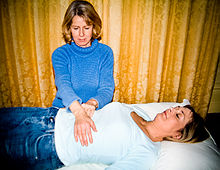
| Part of a series on |
| Alternative medicine |
|---|
 |
Reiki (/ˈreɪki/ RAY-kee; Japanese: 霊気) is a pseudoscientific form of energy healing, a type of alternative medicine originating in Japan.[1] Reiki practitioners use a technique called palm healing or hands-on healing through which, according to practitioners, a "universal energy" is transferred through the palms of the practitioner to the client, to encourage emotional or physical healing. It is based on qi ("chi"), which practitioners say is a universal life force, although there is no empirical evidence that such a life force exists.[2][3]
Reiki is used as an illustrative example of pseudoscience in scholarly texts and academic journal articles.[2][3] The marketing of reiki has been described as "fraudulent misrepresentation",[3] and itself as a "nonsensical method",[4] with a recommendation that the American government agency NCCAM should stop funding reiki research because it "has no substantiated health value and lacks a scientifically plausible rationale".[5]
Clinical research does not show reiki to be effective as a treatment for any medical condition, including cancer,[6][7] diabetic neuropathy,[8] anxiety or depression.[9] There is no proof of the effectiveness of reiki therapy compared to placebo. Studies reporting positive effects have had methodological flaws.[2]
- ^ Cite error: The named reference
r597was invoked but never defined (see the help page). - ^ a b c Cite error: The named reference
Lee_Pittler_Ernst_2008was invoked but never defined (see the help page). - ^ a b c Cite error: The named reference
Bellamy_6/12/2014was invoked but never defined (see the help page). - ^ Cite error: The named reference
Barrett_3/3/2022was invoked but never defined (see the help page). - ^ Cite error: The named reference
Barrett_6/23/2009was invoked but never defined (see the help page). - ^ Cite error: The named reference
ACSwas invoked but never defined (see the help page). - ^ Cite error: The named reference
Cancer Research UKwas invoked but never defined (see the help page). - ^ Cite error: The named reference
Bril2001was invoked but never defined (see the help page). - ^ Cite error: The named reference
Joyce_Herbison_4/3/2015was invoked but never defined (see the help page).